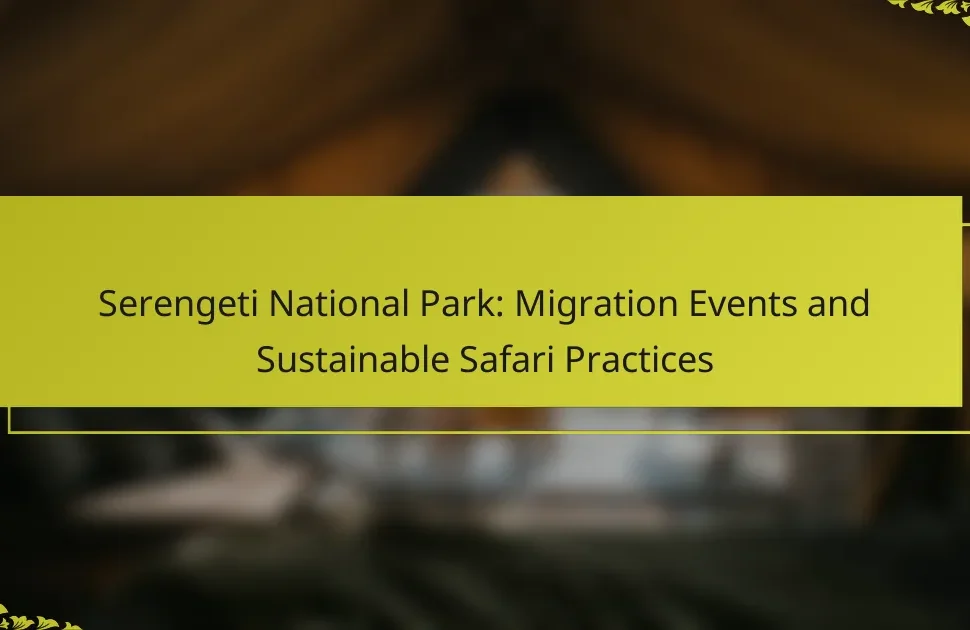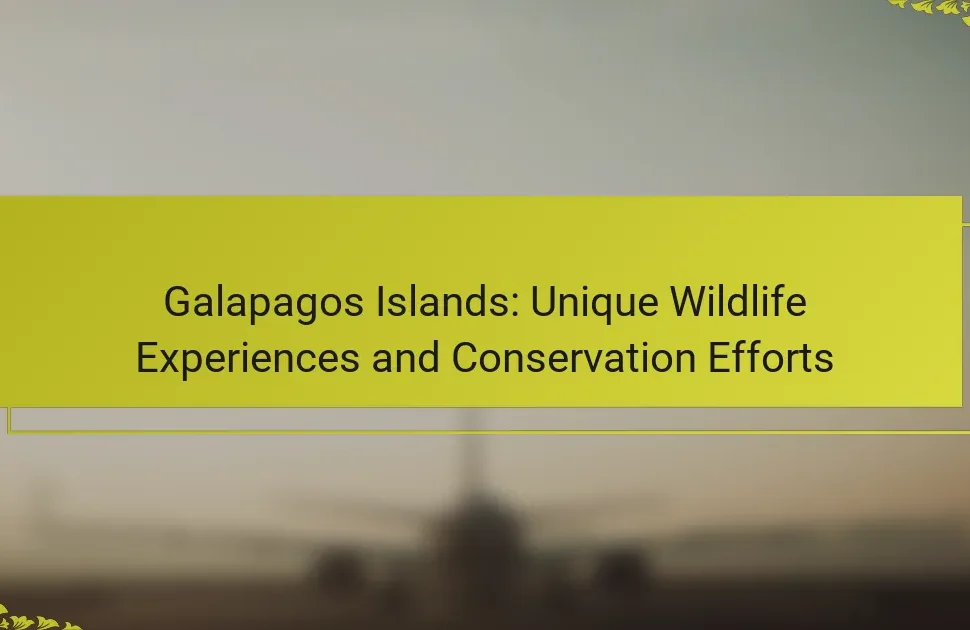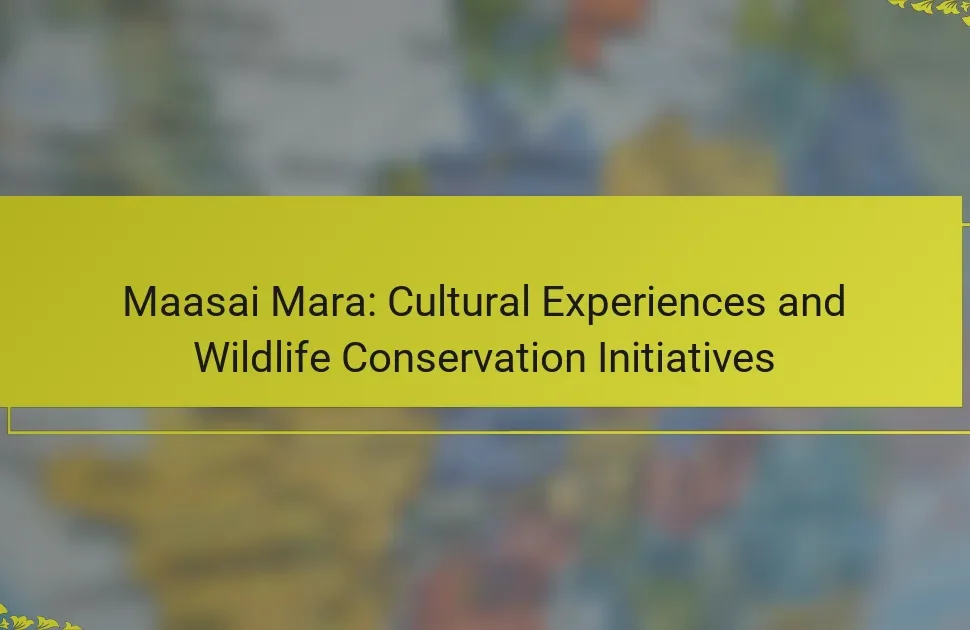Costa Rica offers eco-friendly lodging that enhances your travel experience while supporting sustainability. Discover accommodations that integrate renewable energy, promote conservation, and engage local communities. Immerse yourself in biodiversity through guided nature walks and wildlife observation. Experience unique wildlife encounters and participate in community-driven initiatives that enrich your understanding of the environment.

What makes eco-friendly lodging in Costa Rica unique?
Eco-friendly lodging in Costa Rica stands out due to its integration with nature, sustainability practices, and local community engagement. These lodgings often utilize renewable energy sources, such as solar power, and promote conservation efforts. Many facilities are designed to blend seamlessly with their surroundings, offering guests immersive biodiversity experiences. Unique attributes include the use of local materials and organic food sourced from nearby farms, enhancing the overall eco-tourism experience. As a result, visitors enjoy not only comfort but also a deeper connection to Costa Rica’s rich ecosystems.
How do eco-lodges contribute to local biodiversity?
Eco-lodges significantly enhance local biodiversity by promoting conservation efforts and sustainable practices. They provide habitats for various species and support the preservation of native flora and fauna. Eco-lodges often engage in reforestation initiatives, which restore ecosystems and increase biodiversity. Additionally, they educate visitors about local environmental issues, fostering a culture of conservation. By prioritizing sustainable tourism, eco-lodges create economic incentives for local communities to protect their natural resources.
Which sustainable practices are commonly adopted by these lodgings?
Eco-friendly lodgings in Costa Rica commonly adopt sustainable practices such as waste reduction, energy efficiency, and water conservation. Many facilities implement recycling programs and utilize solar energy. Organic gardening and sourcing local food also enhance sustainability. Additionally, these lodgings often engage in community conservation efforts to protect biodiversity.
What certifications should eco-lodges have?
Eco-lodges in Costa Rica should have certifications like the Certification for Sustainable Tourism (CST) and the Rainforest Alliance certification. These certifications ensure eco-lodges meet environmental standards and promote biodiversity. The CST evaluates sustainability practices, while the Rainforest Alliance focuses on conservation and community benefits. Additional certifications may include LEED for green building practices or EarthCheck for environmental management. These credentials enhance the eco-lodge’s credibility and commitment to sustainability.

How can visitors immerse themselves in biodiversity experiences?
Visitors can immerse themselves in biodiversity experiences in Costa Rica through eco-friendly lodging and various activities. Staying in sustainable accommodations allows guests to connect with nature while supporting conservation efforts. Engaging in guided nature walks, birdwatching tours, and wildlife observation enhances the experience. Many lodges offer educational programs that highlight local ecosystems and conservation practices. Additionally, participating in community-led initiatives fosters a deeper understanding of biodiversity and its importance.
What are the best locations for wildlife watching?
Costa Rica offers some of the best wildlife watching locations globally, thanks to its rich biodiversity. Key areas include Corcovado National Park, renowned for its diverse ecosystems, and Tortuguero National Park, famous for turtle nesting. Monteverde Cloud Forest is ideal for birdwatching, especially the resplendent quetzal. Manuel Antonio National Park combines beautiful beaches with wildlife viewing opportunities. Each site provides eco-friendly lodging options that enhance the experience while promoting conservation efforts.
Which activities promote environmental awareness while exploring nature?
Exploring nature in Costa Rica through eco-friendly lodging enhances environmental awareness. Activities such as guided nature hikes, wildlife observation tours, and hands-on conservation projects provide immersive experiences. Visitors learn about biodiversity and sustainable practices, fostering a deeper connection to the environment. Engaging in local community initiatives, like reforestation, further promotes eco-consciousness.
How do guided tours enhance biodiversity experiences?
Guided tours significantly enhance biodiversity experiences by providing expert insights and fostering deeper connections with nature. These tours often include knowledgeable guides who explain the ecological significance of various species and habitats, enriching the visitor’s understanding and appreciation. Additionally, guided tours often promote sustainable practices, encouraging responsible interaction with the environment. They can also lead to unique encounters with rare wildlife, making the experience memorable and impactful.
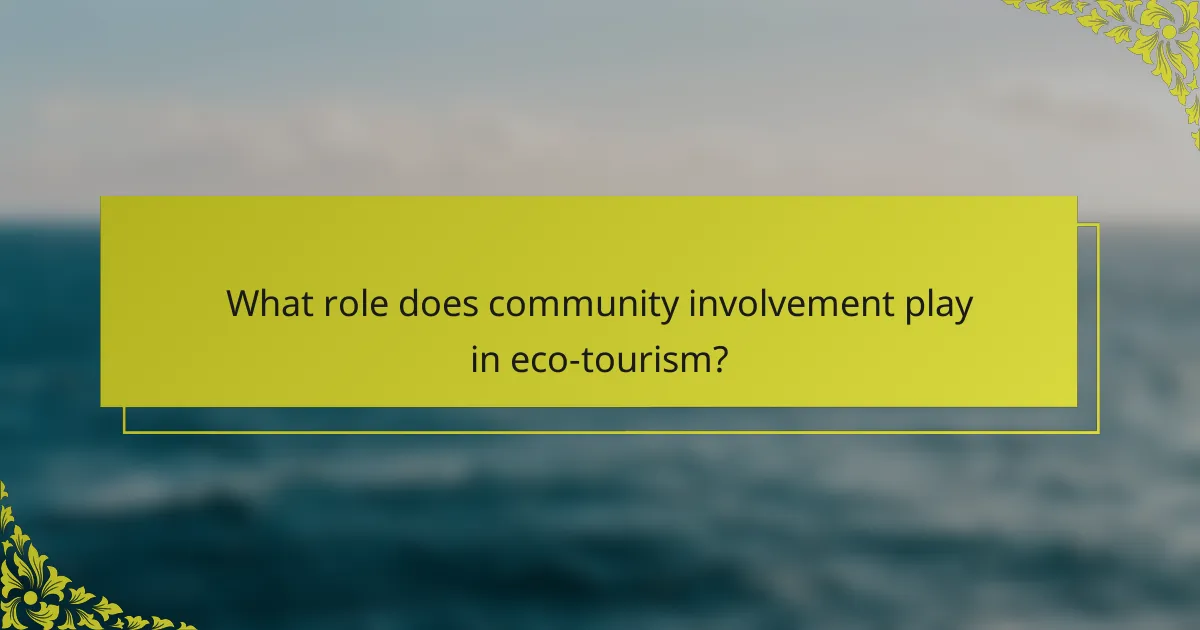
What role does community involvement play in eco-tourism?
Community involvement is crucial in eco-tourism as it fosters sustainable practices and enhances local economies. In Costa Rica, eco-friendly lodging promotes biodiversity experiences while engaging local communities. This involvement ensures that tourism benefits residents, preserving cultural heritage and environmental integrity. Local participation leads to better conservation efforts and more authentic experiences for visitors. Additionally, community-driven initiatives often result in unique offerings, such as guided nature tours or traditional cooking classes, enriching the eco-tourism experience.
How do local communities benefit from eco-friendly lodging?
Local communities benefit from eco-friendly lodging through economic support, environmental conservation, and cultural preservation. Eco-lodges often hire local staff, boosting employment and income. They promote sustainable practices, which protect biodiversity and natural resources. Additionally, these lodgings encourage visitors to engage with local cultures, fostering appreciation and respect for traditions.
What partnerships exist between lodges and conservation organizations?
Lodges in Costa Rica often partner with conservation organizations to promote biodiversity and sustainable tourism. These collaborations enhance ecological education and fund conservation efforts. For example, many lodges support reforestation projects, wildlife rehabilitation, and community engagement initiatives. Such partnerships help preserve the unique ecosystems of Costa Rica while providing guests with meaningful experiences.
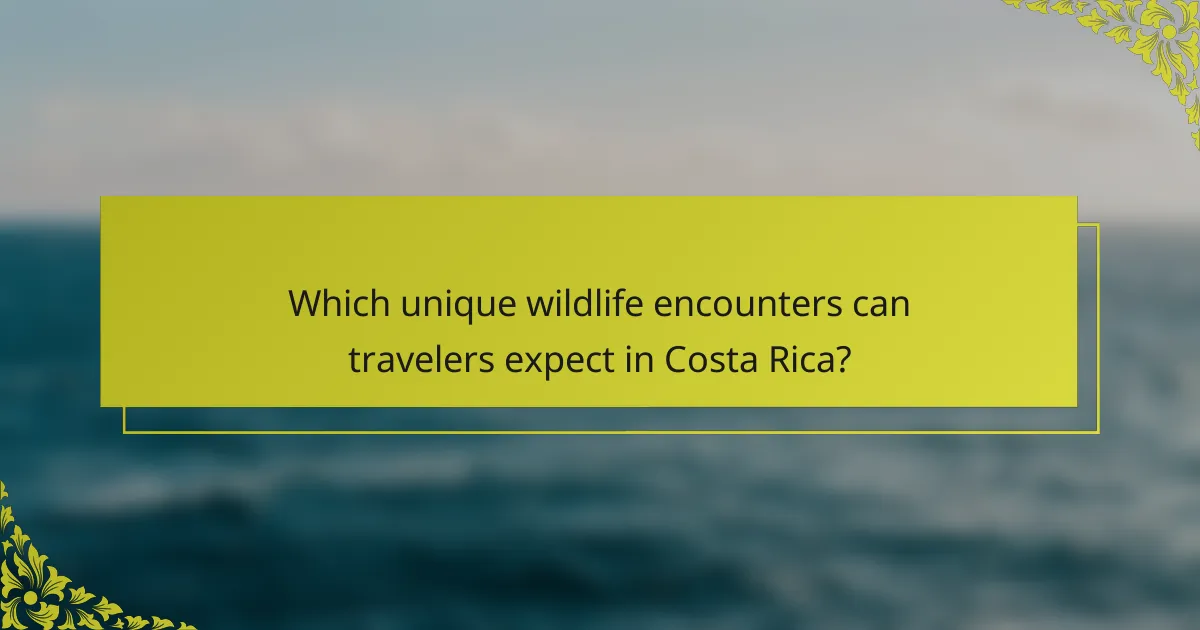
Which unique wildlife encounters can travelers expect in Costa Rica?
Travelers can expect unique wildlife encounters such as sloths, toucans, and sea turtles in Costa Rica. The country’s diverse ecosystems support rich biodiversity, making it a prime destination for nature lovers. Guided tours often highlight rare species, including the resplendent quetzal and the endangered green sea turtle. Eco-friendly lodges provide immersive experiences, allowing visitors to observe wildlife in their natural habitats. Many areas, like Corcovado National Park, offer opportunities to see elusive creatures such as jaguars and tapirs.
What rare species can be spotted in specific regions?
Costa Rica is home to several rare species, including the Resplendent Quetzal and the Baird’s Tapir. These species can be spotted in specific regions such as Monteverde Cloud Forest and Corcovado National Park. The Resplendent Quetzal thrives in high-altitude cloud forests, while the Baird’s Tapir prefers lowland tropical forests. Observing these rare animals enhances eco-friendly lodging experiences in Costa Rica’s rich biodiversity.
How do seasonal changes affect wildlife visibility?
Seasonal changes significantly influence wildlife visibility in Costa Rica. During the dry season, animals are often more visible as they congregate around limited water sources. In contrast, the wet season brings lush vegetation, which can obscure sightings but enhances biodiversity experiences. Migratory patterns also shift with the seasons, offering unique opportunities to observe different species throughout the year. For instance, the arrival of migratory birds in the rainy season enriches the wildlife experience for eco-tourists.
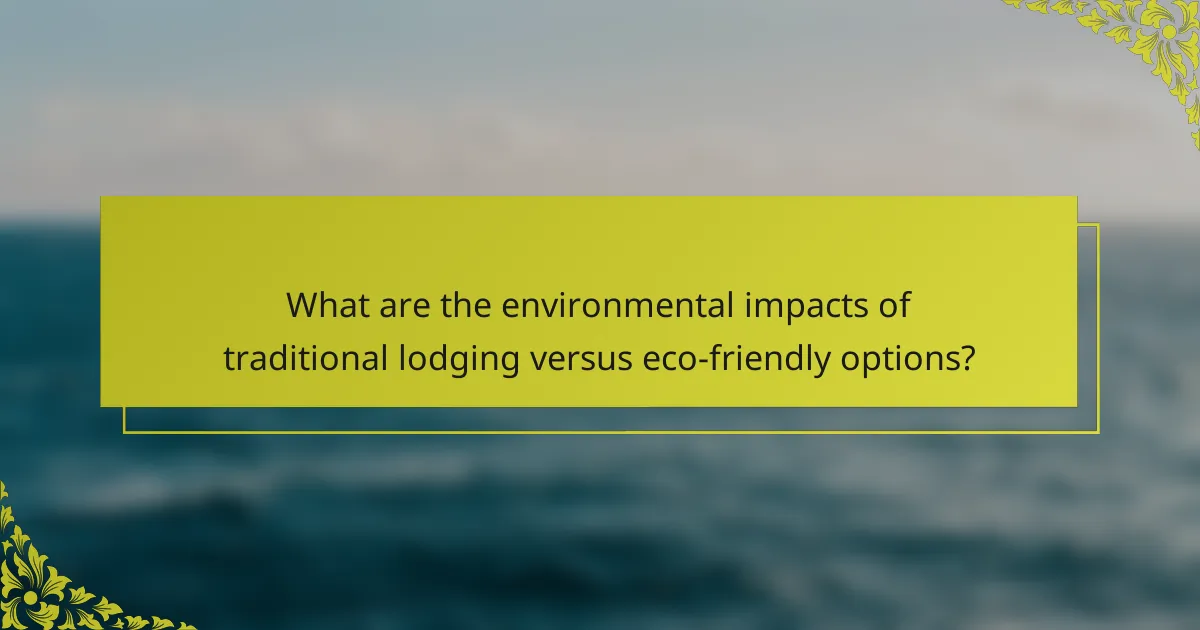
What are the environmental impacts of traditional lodging versus eco-friendly options?
Eco-friendly lodging has significantly lower environmental impacts compared to traditional lodging. Traditional options often involve higher energy consumption, waste generation, and land use, harming biodiversity. In contrast, eco-friendly accommodations utilize sustainable practices, such as solar energy and water conservation, preserving ecosystems. For instance, Costa Rica’s eco-lodges often blend with nature, minimizing disruption to wildlife habitats. This approach supports local biodiversity and promotes conservation efforts, making eco-friendly lodging a superior choice for environmentally conscious travelers.
How does energy consumption differ between eco-lodges and conventional hotels?
Energy consumption in eco-lodges is generally lower than in conventional hotels due to sustainable practices. Eco-lodges often utilize renewable energy sources, such as solar power, and implement energy-efficient designs. In contrast, conventional hotels typically rely on non-renewable energy and may have higher overall consumption due to larger facilities and amenities. Eco-lodges prioritize conservation, reducing their carbon footprint significantly compared to their conventional counterparts.
What waste management practices are implemented in eco-friendly lodging?
Eco-friendly lodging in Costa Rica implements various waste management practices, including recycling, composting, and waste reduction initiatives. These practices minimize environmental impact and promote sustainability. Many lodges use biodegradable products and educate guests on responsible waste disposal. Additionally, some establishments partner with local organizations to ensure proper waste processing and contribute to community clean-up efforts. These efforts reflect a commitment to preserving biodiversity while enhancing guest experiences.

What are the challenges faced by eco-friendly lodging providers?
Eco-friendly lodging providers in Costa Rica face several challenges. These include high operational costs, limited access to sustainable materials, regulatory compliance, and competition from traditional accommodations. Additionally, attracting eco-conscious travelers requires effective marketing strategies that emphasize biodiversity experiences.
How do economic factors influence the sustainability of these businesses?
Economic factors significantly influence the sustainability of eco-friendly lodging and biodiversity experiences in Costa Rica. The country’s focus on ecotourism attracts environmentally conscious travelers, driving demand for sustainable practices.
Factors such as government incentives for green businesses encourage investment in renewable energy and conservation efforts. For instance, tax breaks for eco-lodges promote the use of sustainable materials and energy-efficient technologies.
Additionally, fluctuating economic conditions can impact tourist spending. A strong economy typically leads to increased travel budgets, benefiting eco-friendly establishments. Conversely, economic downturns may reduce discretionary spending, affecting occupancy rates and revenue for these businesses.
Lastly, local community involvement is crucial. Economic stability in surrounding areas supports sustainable practices, as communities benefit from tourism revenue and are incentivized to preserve natural resources.
What are common misconceptions about eco-tourism in Costa Rica?
Many misconceptions surround eco-tourism in Costa Rica, primarily regarding its impact and accessibility. Some believe eco-tourism harms local environments, but it often promotes conservation efforts. Others think eco-friendly lodging is expensive, yet many affordable options exist. Additionally, some assume eco-tourism only caters to affluent travelers, overlooking diverse experiences available for all budgets. Lastly, a common myth is that eco-tourism lacks adventure, while Costa Rica offers thrilling activities like zip-lining and wildlife tours.
How can travelers support eco-friendly lodging initiatives?
Travelers can support eco-friendly lodging initiatives by choosing accommodations that prioritize sustainability. Booking lodgings with green certifications ensures responsible practices. Engaging with local communities and participating in conservation activities enhances biodiversity efforts. Additionally, reducing waste and conserving resources during stays contributes positively to the environment.

What tips can enhance your eco-friendly lodging experience?
To enhance your eco-friendly lodging experience in Costa Rica, prioritize sustainability, local culture, and biodiversity. Choose accommodations that utilize renewable energy, promote conservation, and support local communities. Engage in activities like guided nature tours and wildlife observation to deepen your connection with the environment. Consider these tips:
1. Research eco-certifications of lodges.
2. Opt for locally sourced food options.
3. Participate in conservation programs.
4. Use public transport or bicycles for local travel.
How to choose the right eco-lodge for your needs?
Choose an eco-lodge that aligns with your values and needs by considering location, sustainability practices, and available activities. Look for lodges that prioritize biodiversity conservation and offer immersive nature experiences. Evaluate their commitment to eco-friendly initiatives, such as renewable energy use and local community support. Assess the types of accommodations and amenities that enhance your stay, ensuring they match your comfort and adventure preferences.
What should travelers consider when booking biodiversity experiences?
Travelers should prioritize sustainability, local culture, and unique biodiversity when booking experiences in Costa Rica. Consider eco-friendly lodging options that support conservation efforts. Research local guides who emphasize responsible practices and cultural education. Explore diverse ecosystems, such as rainforests and coastal areas, to maximize wildlife encounters. Look for experiences that promote community engagement and conservation initiatives.
What are the best practices for responsible travel in Costa Rica?
To practice responsible travel in Costa Rica, choose eco-friendly lodging and support local conservation efforts. Prioritize sustainable activities that respect biodiversity. Engage with local communities to enhance cultural understanding and minimize your environmental impact. Always follow guidelines for wildlife interactions to preserve natural habitats.


